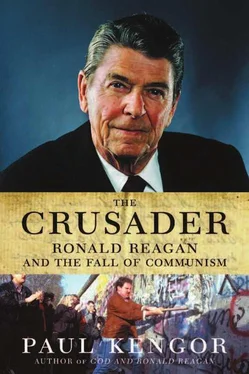39. Coll, “Anatomy of a Victory,” A1.
40. Rodman, More Precious Than Peace, 339.
41. Jack F. Matlock, Autopsy of an Empire (New York: Random House, 1995), 747–48.
42. Reagan, An American Life, 660. Later recalling Gorbachev’s “strong motives for wanting to end the arms race,” Reagan asserted: “The Soviet economy was a basket case, in part because of enormous expenditures on arms. He had to know that the quality of American military technology, after reasserting itself beginning in 1981, was now overwhelmingly superior to his. He had to know we could outspend the Soviets on weapons as long as we wanted to” (14–15).
43. Reagan to William F. Buckley, Jr., May 5, 1987 in Skinner, Anderson, and Anderson, eds., Reagan: A Life in Letters, 418–19.
44. Gorbachev speaking on Soviet television, October 14, 1986. Remarks provided by Peter Schweizer.
45. Shevardnadze November 1991 interview with International Affairs (Moscow), in “Retrospective on the End of the Cold War,” Woodrow Wilson School, Princeton University, February 25–27, 1993, 6.
46. Bessmertnykh speaking during February 25–27, 1993 conference at Princeton University. Remarks published in Wohlforth, ed., Witnesses to the End of the Cold War, 31–32.
47. Ibid., pp. 47–48.
48. Estimate is provided by Peter Schweizer in Reagan’s War.
49. Ellman and Kontorovich, eds., The Disintegration of the Soviet Economic System, 13–16, 19. Michael Ellman and Vladimir Kontorovich, economics professors with expertise on the Soviet economy, said that it was the “unprecedented peacetime escalation of military expenditures and the other costs of being a superpower” that sapped the USSR. They note that while the USSR was doomed in the long run, it was certainly not predestined to disintegrate in the late 1980s. That demise, Ellman and Kontorovich found, “could have been alleviated by appropriate policies.” Even Yuri Andropov had notable success by applying strict policies, particularly by replacing ineffective managers and corrupt officials and ministers; he also benefited from a series of better harvests in the agricultural sector. In all, the Soviet economy had recovered from its 1979–82 decline.
50. Akhromeev quoted by Ellman and Kontorovich, “The collapse of the Soviet system and the memoir literature,” Europe-Asia Studies, 49, no. 2 (March 1997): 259. 7. Brown, The Gorbachev Factor, 249.
8. Ibid. To be sure, Gorbachev later moved away from this sentiment. Yet, this language, especially shared privately, in no way helped those hoping for democracy in East Germany and Eastern Europe as a whole. To the contrary, it very much hurt their efforts.
9. The first of these was in an August 7 interview with the West German publication Bild Zeitung. After describing the wall as an “affront to the human spirit” and a symbol of the “failings of totalitarian regimes,” he was asked: “When do you believe the wall can be torn down?” He replied: “I would like to see the wall come down today, and I call upon those responsible to dismantle it.” He urged the wall come down again in an August 12 news conference. The skeptical reporter retorted: “How realistic is it, though? Some critics have suggested it raises false hopes for those beyond the wall.” Reagan said he did not think so. He assessed again on August
13—the wall’s twenty-fifth anniversary—stating that the wall “cannot be” a permanent structure and affirming that it “will come down.” See, respectively, Reagan, “Written Responses to Questions Submitted by Bild-Zeitung of the Federal Republic of Germany,” August 7, 1986; Reagan, “The President’s News Conference,” August 12, 1986; and Reagan, “Statement on the
25th Anniversary of the Berlin Wall,” August 13, 1986.
10. Reagan, “Written Responses to Questions Submitted by Deutsche Presse-Agentur of the Federal Republic of Germany,” June 2, 1987.
11. Reagan, “Written Responses to Questions Submitted by Die Welt of the Federal Republic of Germany,” June 12, 1987.
12. Reagan, “Statement on the Fifth Anniversary of the Founding of the Solidarity Movement in Poland,” August 31, 1985.
13. Reagan, “Statement on the Lifting of Economic Sanctions Against Poland,” February
19, 1987.
14. Robinson, How Ronald Reagan Changed My Life, 99–100, 192.
15. Reagan, “Address to the Conservative Political Action Conference,” Washington, DC, February 19, 1987, in Roberts, ed., A City Upon a Hill, 120.
16. In May, he made a number of freedom statements in West Germany. On May 5,
1985 in Bitburg, he claimed: “[W]e can see a new dawn of freedom sweeping the globe. And we can see in the new democracies of Latin America, in the new economic freedoms and prosperity in Asia…that the light from that dawn is growing stronger.” Reagan, “Remarks at a Joint German-American Military Ceremony at Bitburg Air Base in the Federal Republic of Germany,” May 5, 1985. Traveling west to Oklahoma for another political fundraiser on June
5, he told his fellow Americans: “Like it or not, freedom depends on us.” Reagan, “Remarks at a Fundraising Luncheon for Senator Don Nickles,” Oklahoma City, Oklahoma, June 5, 1985. In a July 18, 1986 speech to, of all groups, the members of the American Legion Auxiliary’s Girls Nation, Reagan said that the “challenges America must face in the world” were “twofold.” “The first is expanding the boundaries of democracy and freedom by curbing, in the face of totalitarian expansion, that urge on the part of some governments to seek domination of even more territory and peoples.” The second was to reduce the threat of nuclear war. He said he was “confident” that both of the goals would be achieved. Reagan, “Remarks to Members of the American Legion Auxiliary’s Girls Nation,” July 18, 1986.
In his January 27, 1987 State of the Union speech, Reagan said it was crucial to prevent Communism’s spread into the Western Hemisphere. Reagan, “State of the Union Address,” January 27, 1987.
On January 24, 1985, Reagan declared that “free and democratic government is the birthright of every citizen of this hemisphere.” Reagan, “Remarks at the Western Hemisphere Legislative Leaders Forum,” January 24, 1985.
17. Reagan, “Remarks at the Western Hemisphere Legislative Leaders Forum,” January 24, 1985. See Reagan, “Remarks to the International Forum of the Chamber of Commerce of the United States,” April 23, 1986; Reagan, “State of the Union Address,” January 27, 1987; Reagan, “Address to the Permanent Council of the OAS,” October 7, 1987.
18. Reagan, “Remarks at the Western Hemisphere Legislative Leaders Forum,” January 24, 1985.
19. This was November 25, 1986.
20. Reagan, “Remarks to Civic Leaders at a White House Briefing on Aid to the Nicaraguan Democratic Resistance,” January 20, 1988.
21. The recurring Chautauqua conference was long an interactive dialogue on relations between the two nations.
22. Reagan, “Remarks on Soviet-US Relations at the Town Hall of California Meeting,” Los Angeles, August 26, 1987.
23. Reagan, “Remarks at the 40th Anniversary Conference of the United States Advisory Commission on Public Diplomacy,” September 16, 1987.
Organization Summit Meeting,” Brussels, Belgium, March 5, 1988; Reagan, “Address to the Citizens of Western Europe,” May 23, 1988; Reagan, “Remarks to the Paasikivi Society and the League of Finnish-American Societies,” Helsinki, Finland, May 27, 1988; Reagan, “Remarks on Signing the Captive Nations Week Proclamation,” July 13, 1988; Reagan, “Statement on the 27 thAnniversary of the Berlin Wall,” August 12, 1988; and Reagan, “Radio Address to the Nation on Soviet-United States Relations,” December 3, 1988. At Moscow State University on May 31, 1988, Reagan called the Berlin Wall “one sad reminder of a divided world” and then said, “It’s time to remove the barriers that keep people apart.” Reagan, “Remarks and a Question-and-Answer Session With the Students and Faculty at Moscow State University,” May 31, 1988.
Читать дальше












